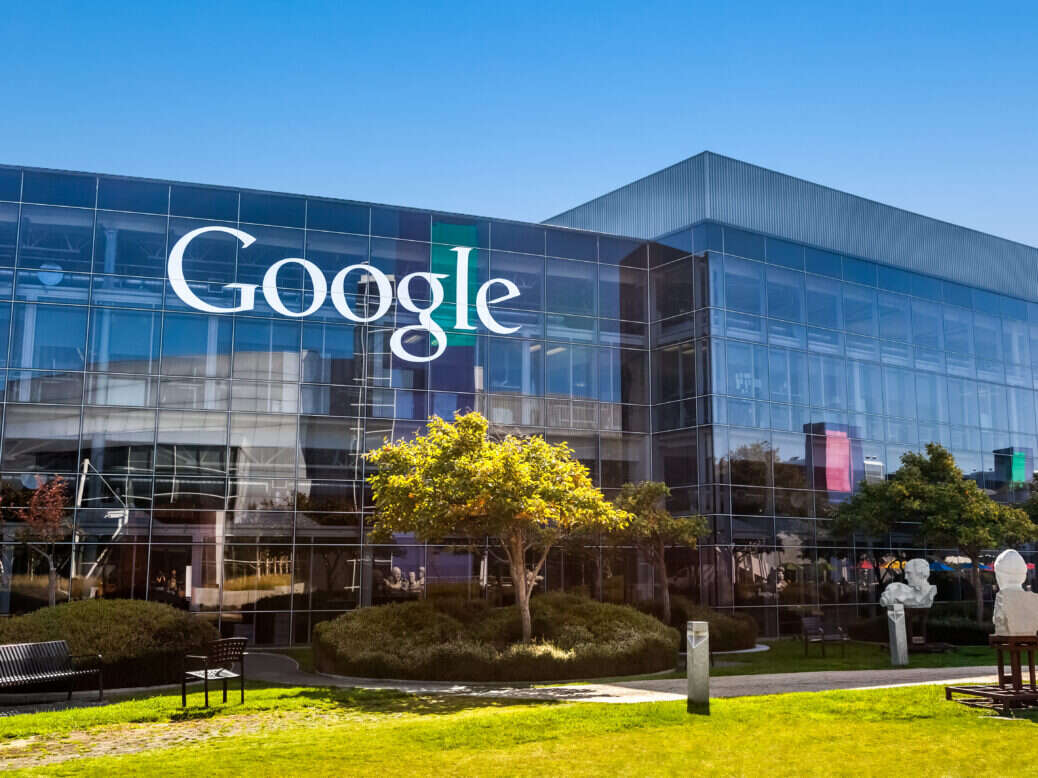
The Sun and Mail Online both feel they are unfairly being downgraded by Google search rankings thus depriving them of audience share.
At The Sun, insiders believe their original scoops are being buried in search results by rival titles who are effectively ripping their content off.
And at Mail Online, a sister title of the right-wing Daily Mail, execs feel that “woke” Google is downgrading the site in favour of the more liberal Guardian and BBC.
The complaints come as Press Gazette also reports allegations from Mail Online’s publisher about “a cavalier abuse of Google’s dominant position in the advertising market, driven by hostile perceptions of Mail Online’s editorial content”.
Responding to a consultation from Ofcom on The Future of Media Plurality in the UK, Sun publisher News UK said: “The platforms prefer recency over provenance of news content, meaning that the incentives to invest in breaking a story is diminished. A publisher who rewrites a story is more likely to receive traffic referrals via platforms than a publisher who invested in writing the story in the first place.”
Google is the biggest single source of traffic for every major news website in the UK.
The claim that Google favours “rips” of Sun articles over the originals appeared to be borne out by the search giant’s treatment of three Sun royal exclusives this week.
- On Friday, The Sun revealed that The Queen had spent a night in hospital.
- On Monday, it reported that she had been forced to miss a church service due to ill health.
- And on Tuesday it revealed that Netflix series The Crown was set to devote an entire episode to Princess Diana’s Martin Bashir interview.
In each case, within 24 hours of publication, The Sun’s original reporting had been buried in search results by stories which were rewritten follow-ups of the same story.
A search on Google for “queen misses church” 11 hours after the Sun exclusive found that articles in The Mirror, Birmingham Mail, Metro and Express all reliant on The Sun report outranked the original Sun article.
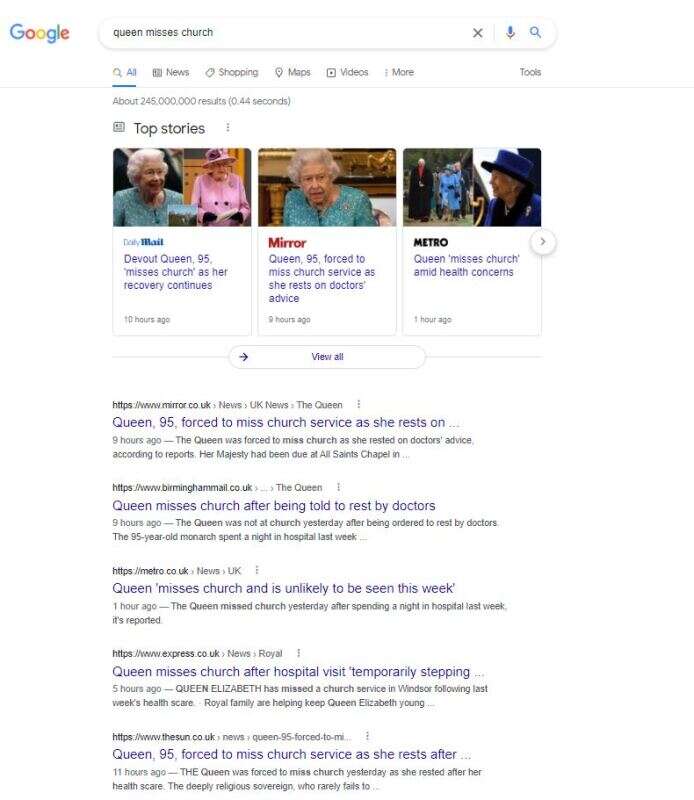
On The Crown exclusive, The Sun featured first in the top stories carousel on Google but was buried in the organic search results below.
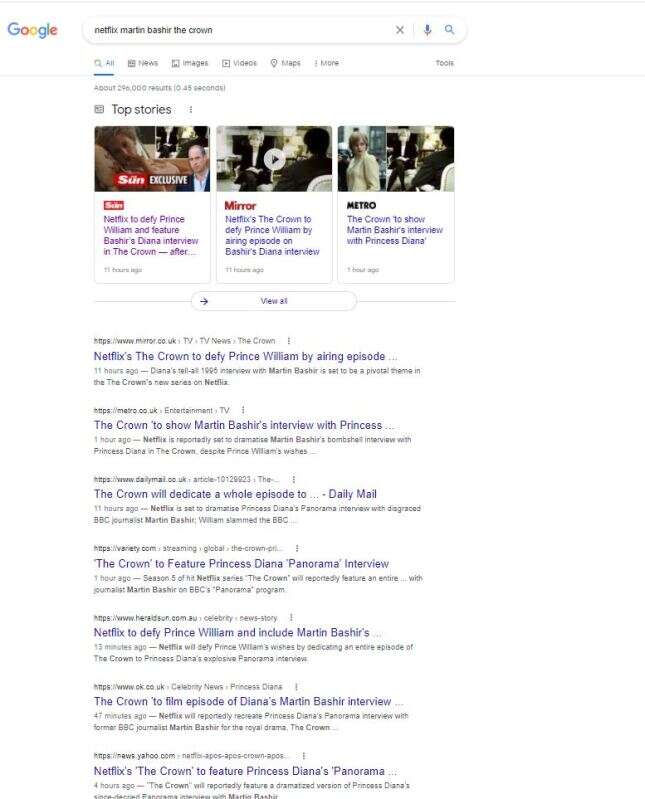
On Tuesday this week, The Sun broke news that “Our Yorkshire Farm” TV star Amanda Owen and husband Clive were “battling to save their 21-year marriage”.
A search for “our Yorkshire farm” on Google found three articles based entirely on The Sun’s reporting outranking it on the top stories carousel.
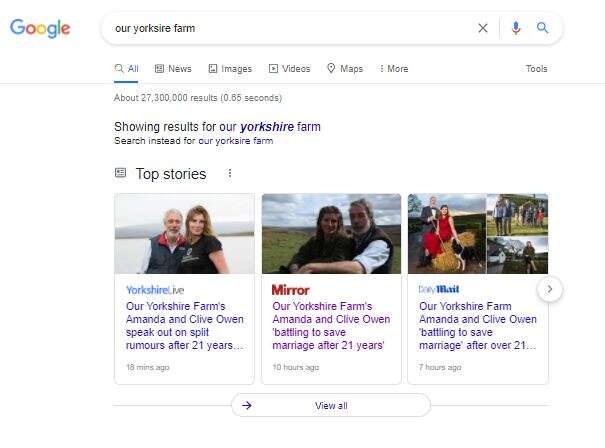
Sun insiders complain that Sun exclusives are continually pushed out of the first few news results on Google search within a few hours, and research seen by Press Gazette appears to support this view.
On 25 June, The Sun published an exclusive revealing health secretary Matt Hancock’s secret affair with an aide.
But at 8.38am on 26 June a Google search for “Matt Hancock” on an iPhone surfaced BBC, Guardian, Independent and Sky follow-ups ahead of the original Sun story.
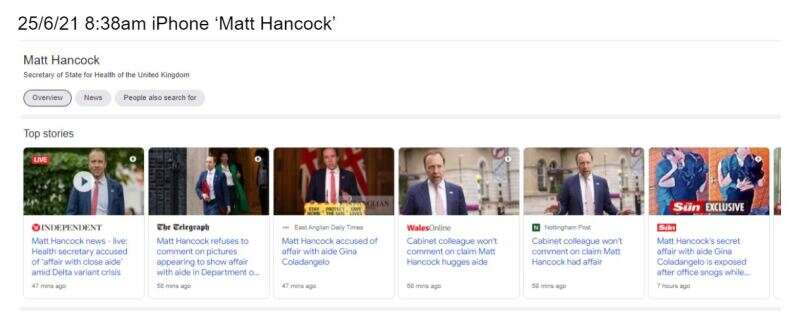
On 28 July, The Sun reported that The X Factor was going to be axed. But a search for “x factor” on an iPhone at 7.20am the following day only surfaced follow-ups from Sky News, The Times, Mirror and other titles.
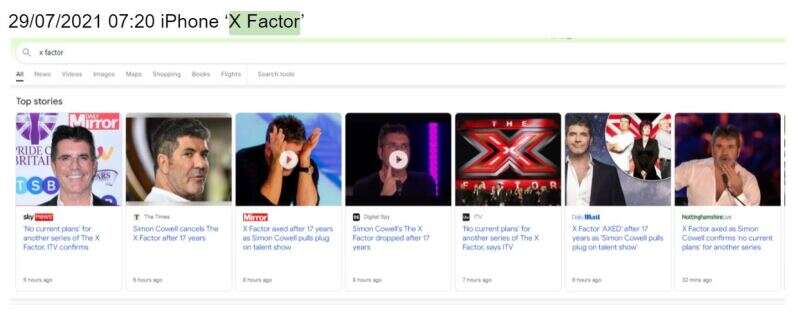
A Google spokesperson responded to these complaints saying: “We recognise the time and resource original reporting involves and that’s why we made ranking updates in 2019 to help us better recognise original reporting, surface it more prominently in Search and ensure it stays there longer.”
Google VP for news Richard Gingras said at the time the changes meant “readers interested in the latest news can find the story that started it all, and publishers can benefit from having their original reporting more widely seen”.
DMG Media: Google strongly favours ‘left-leaning BBC and Guardian’ versus Mail, Telegraph and Sun
Mail Online is the fourth most-popular English language news website in the world, according to Press Gazette’s rankings, and the most popular news site in the UK after the BBC. Its print stablemate the Daily Mail is the UK’s top-selling newspaper and together the Mail titles employ more than 1,000 journalists.
But publisher DMG Media believes it is viewed as an also-ran by Google and unfairly downgraded in search.
DMG Media said in its submission to the Ofcom review that Google has “consistently reduced Mail Online’s search visibility since 2013”.
It reveals that in early June 2019 its search visibility in Google abruptly dropped by 50% only to be restored “following protests at the highest level” three months later.
Mail Online believes the Google algorithm change was designed to punish publishers selling adverts outside Google’s ad exchange.
Using data from the Sistrix search visibility index DMG Media said Mail Online’s visibility on Google had dropped from around 100 at the start of 2021 to around half that by July – a level it has stayed at since.
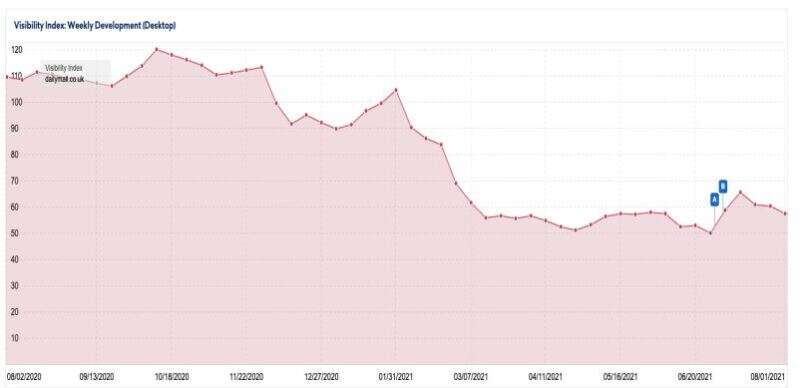
DMG Media’s analysis suggests Google favours The Guardian and BBC, which both score around 400 on the Sistrix index, versus the Mail, Telegraph and Sun on 50-75.
DMG Media said that readers place “great faith in Google”, but: ” Unless
they are students of search visibility, they have no idea that when they search for news Google invariably takes them to two left-leaning news sources, the Guardian and BBC.”
DMG Media said: “Google never explains how its algorithms work, so we cannot be certain why it discriminates so consistently against some publishers and in favour of others.
“We believe we now have a convincing case that its two dramatic algorithm changes in June and September 2019 were dictated by its commercial self-interest, and part of its successful campaign to maximise its profits by preventing publishers from using header bidding in digital advertising.
“For the rest, it certainly appears that Google’s bias against MailOnline is much more pronounced when its algorithms are ranking political stories, than for stories of more general interest.
“Whether this is a deliberate company policy, or simply the result of unconscious bias on the part of Californian web engineers
programming algorithms preferring websites that echo their own ‘woke’ left-liberal views, we cannot know.”
Google issued a robust response on these claims after being contacted by Press Gazette: “These claims are completely inaccurate. Distorting results for these purposes would harm our business and has no bearing on how search works.”
Google has explained more about how it treats news here.
It employs thousands of quality raters who helped the search engine decide which sites it will favour. Their guidelines are published in detail by Google here.
Google: Algorithm is applied universally to news pages
Google said in its own statement to the Ofcom review: “When Google ranks news content, no individual or set of individuals determines the ranking of any particular website. The algorithm is applied universally to news pages online and ranks them accordingly.
“Google’s news algorithms are not designed to influence ranking based on a point of view on issues. While some personalised news experiences are designed to connect users with stories they may be interested in (e.g. based on topics like ‘cricket’ or ‘technology news’), none of Google’s systems endeavour to assess a publisher’s—or a user’s—ideological or political leanings.”
[Read more: Google News Shh…owcase – The secrets behind search Giant’s $1bn scheme]
Email pged@pressgazette.co.uk to point out mistakes, provide story tips or send in a letter for publication on our "Letters Page" blog
